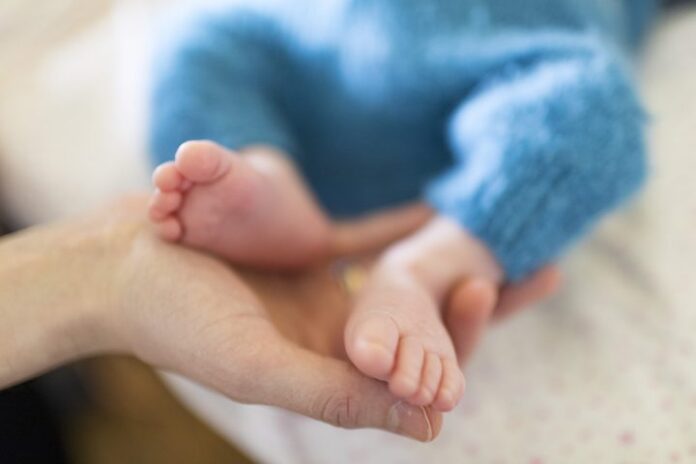A new and groundbreaking study has pinpointed what researchers believe is the reason infants and babies die from sudden infant death syndrome (SIDS).
Researchers from The Children’s Hospital in Westmead in Sydney, Australia, have found that a lowered level of a certain enzyme, called butyrylcholinesterase (BChE), can explain the malfunction that causes some babies not to startle or wake if they stop breathing in their sleep.
The study is published in the latest volume of The Lancet’s eBioMedicine, the upcoming June 2022 issue.
For years, medical experts have suspected that SIDS is caused by a defect in the part of the brain that controls arousal from sleeping and breathing, according to the Mayo Clinic. They theorized that if an infant stopped breathing while asleep, the defect would keep the child from waking up.
The Sydney researchers confirmed the theory by analyzing dried blood samples of 722 babies that were taken during the newborn heel prick test – 655 of the tests were from healthy babies, 26 were from babies who died of SIDS and 41 from babies who died from other causes in infancy.
They found that SIDS babies had lower levels of BChE, an enzyme that’s known for its abilities in the brain’s arousal system.
Alberta man canoeing across the Prairies in memory of grandchild lost to SIDS – Jun 11, 2021
“Up to now we didn’t know what was causing the lack of arousal,” Dr. Carmel Harrington, who led the project and lost her own son to SIDS 29 years ago, told The Guardian.
“An apparently healthy baby going to sleep and not waking up is every parent’s nightmare and until now there was absolutely no way of knowing which infant would succumb.”
According to Statistics Canada data from 2015 to 2020, approximately 1,700 babies under the age of one died in Canada per year. On average, one in 15 of those deaths occurred while the infant was sleeping.
Trending Stories
Weekend gas prices on the rise across Canada as experts urge motorists to reduce travel
David Milgaard, wrongfully imprisoned for 23 years, dies at 69
The agency says that while a number of those deaths were of natural causes, 83 per cent occurred in a sudden and unexpected way in otherwise healthy babies.
The Public Health Agency of Canada, in partnership with a number of other Canadian health organizations, recommends a number of sleep safety practices, including:
Put infants down on their backs to sleep, in their own crib or bassinet.Prevent exposure to tobacco smoke before and after birth.Avoid bed-sharing.Avoid overheating.Remove toys and soft bedding from sleeping surfaces.
Harrington told the Australian Broadcasting Corporation that she became interested in researching SIDS after doctors were unable to explain her son’s death.
“Nobody could tell me. They just said it’s a tragedy. But it was a tragedy that didn’t sit well with my scientific brain.”
Now that her team has pinpointed a cause, she said other families “can now live with the knowledge that this was not their fault.”
The study says researchers will now turn their attention to having the BChE biomarker added to newborn screening and “develop specific interventions to address the enzyme deficiency.”
They expect these next steps to take around five years to complete.
“This discovery changes the narrative around SIDS and is the start of a very exciting journey ahead. We are going to be able to work with babies while they are living and make sure they keep living,” Harrington said.
However, some experts are urging caution about the study, arguing that the sample size used by the Australian team is quite small and the blood samples that were analyzed were more than two years old.
Dr. Gabrina Dixon, director of advancing diversity in academic pediatrics at Children’s National in Washington, told CNN that the study was interesting, “but I wouldn’t call it a thing yet. It could be promising for future research, but it’s such a small number of kids in this study, you need a lot more numbers to say that this is what it is.”
On Thursday, First Candle, an organization dedicated to ending SIDS and other sleep-related infant deaths, issued caution about the study.
“This is progress, and for that we should be optimistic, but it’s not the entire answer,” CEO Alison Jacobson said in a statement. “Our concern with the development of a test for the vulnerability to SIDS is with parents having a false sense of security and adopting unsafe sleep practices.”
Jenny Ward, the chief executive of the Lullaby Trust, told The Guardian that it’s important that caregivers continue to follow safe sleeping advice.
“The findings of this study are interesting and more work needs to be done. We look forward to seeing more as this research continues and hope that it helps us understand more about sudden infant death syndrome.”
© 2022 Global News, a division of Corus Entertainment Inc.



